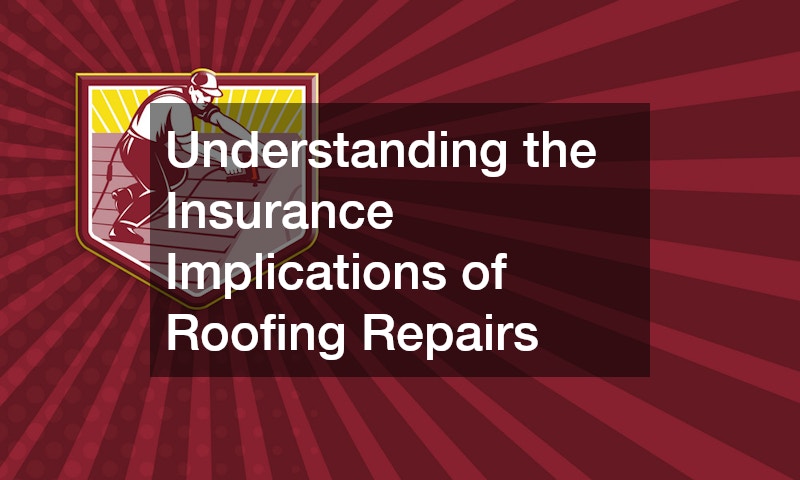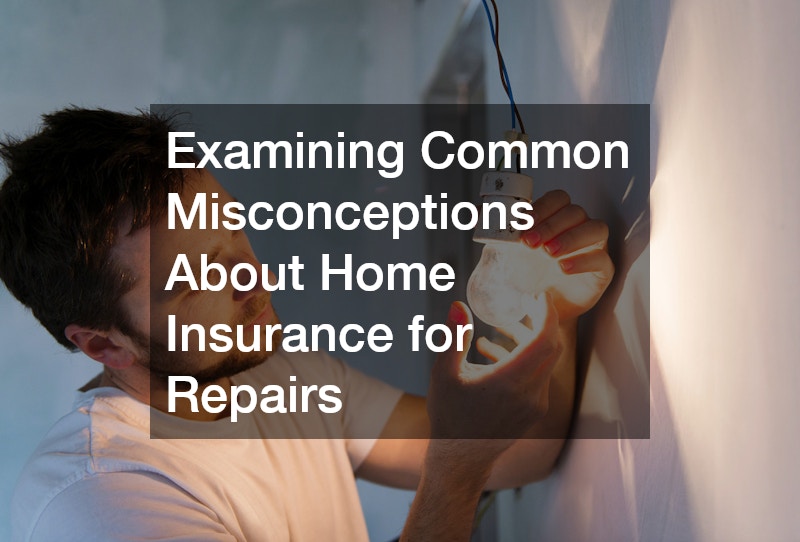Home insurance for repairs is a crucial aspect of maintaining the value and safety of your property. However, navigating insurance coverage can be complex, especially when it involves repairs and renovations. This article aims to provide clarity and insights into how home insurance for repairs works and what homeowners should be aware of.
Whether you’re dealing with foundation crack repair or planning a major renovation, understanding your insurance coverage can save you time and money. Many homeowners are unaware of the specifics of their policies until they need to file a claim. We will explore common misunderstandings and provide information to help you make informed decisions.
Join us as we debunk myths and uncover the realities regarding homeowners insurance and home repairs, from roofing and window replacements to plumbing services. This comprehensive guide will help ensure that you’re well-prepared to handle your home insurance needs.
Debunking Common Myths About Homeowners Insurance Coverage

A prevalent myth is that homeowners insurance covers all types of home repairs, which is not accurate. While it helps to cover unexpected damages, routine maintenance and wear-and-tear are generally not included. Understanding the limitations of your policy is vital to avoid false expectations and missed opportunities for coverage.
Some believe that any contractor hired, such as general contractors or masonry repair contractors, will automatically ensure claims are processed successfully. However, choosing an unlicensed or uninsured contractor can lead to denied claims or extra costs. It’s important to verify credentials before hiring to avoid complications.
Another myth is that homeowners insurance covers damages caused by natural disasters like floods or earthquakes. Typically, standard policies do not include these coverages, requiring separate policies or endorsements. Knowing the specific exclusions of your policy can guide you in obtaining additional necessary coverages.
The Reality of Insurance Coverage for Home Improvement Projects

When undertaking home improvement projects, it’s essential to ascertain how they affect your insurance. Not all upgrades or changes will be covered, especially if they increase the home’s value without notifying the insurance company. Ensuring your policy is updated to reflect these changes is crucial for adequate protection.
Some home enhancements, like installing replacement windows or upgrading with energy-efficient systems, might offer insurance discounts. Nevertheless, the initial assumption should not be automatic savings. Consulting your insurer can clarify which improvements qualify for potential premium reductions and ensure they are recognized.
Projects addressed by residential roofing contractors, for instance, may impact your coverage significantly. Since the roof protects against environmental factors, ensuring that the installation meets local codes and manufacturer’s specifications can prevent disputes with insurers during claims. Ensuring compliance with regulations beforehand is crucial.
What You Should Know About Insurance and Your Home’s Windows

Homeowners considering replacement windows should be aware of their insurance implications. While improving insulation and energy efficiency can be beneficial, it’s important to notify your insurer about such updates. Failing to update your policy can lead to underinsurance, affecting future claims involving these upgrades.
Replacement windows under home insurance for repairs generally cover damages caused by specific perils, such as storms or vandalism. Understanding the distinction between covered perils and routine wear-and-tear helps avoid misunderstandings during the claims process. This clarity can save both time and frustration in the long run.
For optimal coverage, it might be necessary to consider specific endorsements for rare window types or configurations. Investing in additional protection can be essential when dealing with non-standard or custom installations, ensuring peace of mind and adequate coverage in unique scenarios.
Understanding the Insurance Implications of Roofing Repairs

Roofing repairs can significantly impact your insurance policy, particularly if your roof is aged or damaged. Engaging residential roofing contractors with proper licensing and insurance is vital for protecting your investment and ensuring smooth processing of future claims. Hiring reputable contractors minimizes risk and ensures quality repairs.
Insurance policies typically cover roofs damaged by covered perils like wind or hail. However, they often exclude damage from neglect or lack of maintenance, making proactive roof care essential. Regular inspections and maintenance can prevent avoidable disputes with your insurer by proving your responsible ownership.
Updating your insurance policy to reflect new roofing materials or designs is also crucial. Different materials, such as impact-resistant shingles, may qualify for discounts or alter your premiums. Understanding these implications helps maximize your coverage benefits while maintaining adequate protection.
The Hidden Truth About Insurance and Electrical Work in Your Home
When it comes to electrical work, engaging qualified, licensed electricians is crucial for safety and compliance with your insurance policy. Attempting DIY electrical repairs can result in significant risks, including fire hazards and policy violations. Professional electricians can ensure the work meets current safety standards and reduces potential liabilities.
While insurance typically covers damages caused by electrical fires, it might exclude those resulting from faulty DIY repairs or non-compliance. Ensuring that all electrical updates are performed by certified electricians can help secure your coverage in case of future claims. Documenting all upgrades can further support your claims process.
Additional insurance considerations include knowing whether certain electrical upgrades, such as circuit panel renovations, necessitate policy updates. Discussing these changes with your insurer is advisable to ensure your policy accurately reflects the current state of your home’s electrical system.
How Home Repairs Can Affect Your Insurance Claims
Home repairs, particularly those involving structural changes, can have substantial effects on your insurance claims. Notifying your insurer of significant repairs or renovations is necessary to avoid complications during claims. Accurate and up-to-date records help ensure smooth processing and reflect your home’s current value.
Another key aspect of home insurance for repairs is understanding how each repair influences your coverage. Upgrades in areas like plumbing or electrical systems might affect your home’s risk profile and premiums. Staying informed minimizes surprises and prepares you better for potential costs or savings in your policy.
Photographic documentation before and after repairs can be critical evidence during claims. It provides a visual comparison that can substantiate claims and support the claims adjustment process, helping to expedite any disputes or discrepancies. Comprehensive records reinforce the integrity of your claims.
Clarifying Coverage: What to Expect from Your Plumbing Services
Understanding plumbing services and their coverage under home insurance for repairs is essential for homeowners. Coverage often includes damages from sudden, accidental water discharge but excludes gradual leaks or poor maintenance. Recognizing this distinction is paramount to establishing correct expectations about claim outcomes. If you have questions, reaching out to a local specialist like a water heater repair company or emergency plumber may be idea depending on the water source in question.
Working with licensed plumbing service professionals ensures repairs align with your policy requirements, reducing rejection risks. Engaging unlicensed workers may void coverage, leaving you responsible for costs. Verification of plumber credentials helps maintain policy validation and successful claim processing.
Consideration should also be given to upgrading plumbing systems to more efficient models. Insurance providers often view such updates favorably, potentially affecting your premiums positively. Discuss these changes with your insurer to optimize benefits and ensure your policy accurately reflects system upgrades.
The Impact of Home Repairs on Your Insurance Premiums
Home repairs can notably impact your insurance premiums, either increasing or decreasing them depending on the changes made. Major repairs or updates can enhance safety and risk profiles, potentially leading to lowered premiums. Understanding this can guide how strategic improvements may benefit your financial commitments.
Conversely, some upgrades might increase premiums by elevating your property’s replacement value. Adjusting coverage to match this new value is crucial to avoid underinsurance during claims. Clear communication with your insurer ensures your policy evolves with your home improvements, providing accurate protection levels.
It’s also beneficial to compare different insurers’ responses to home repairs when considering policy renewals. Some companies offer better incentives or adjust ratings based on improvements, influencing your premium positively. Thorough research helps identify the most cost-effective coverage for your repaired home.
Why Proper Leak Detection Is Essential for Insurance Claims
Effective leak detection plays a crucial role in facilitating successful insurance claims. Undetected leaks can lead to extensive damage, often excluded from coverage due to negligence. Engaging professional leak detection services ensures early identification and resolution, preserving your policy’s integrity.
Applying routine leak detection not only protects your property but can also positively influence insurance assessments. Detecting issues early mitigates serious damage, potentially securing lower premiums or avoiding surcharge increases. Proactive maintenance can maintain a favorable standing with your insurer.
Comprehensive documentation of detected leaks and repairs should always accompany claims. This evidence supports your proactive management and adherence to policy conditions. With professional assistance, managing leak detection can align well with insurance expectations and secure coverage success.
The Overlooked Aspects of Insurance When Planning Home Renovations
Home renovations carry overlooked insurance implications that can affect protection levels and claims success. Alterations that impact the structure or use of the property may necessitate revisions to your policy. Ensuring these changes are communicated to your insurer prevents coverage lapses or claim denials.
Working with reputable general contractors experienced in insurance concerns can facilitate smoother project and post-project processes. Their knowledge enables compliance with policy conditions and aligns projects with coverage parameters. Selecting contractors aligned with insurance best practices is crucial for renovation success.
Ignorance regarding necessary permits or codes during renovations can endanger claims and overall coverage. Ensuring that all work complies with local regulations is essential to preserve policy validity. Consulting both contractors and insurers at the start of a project can preemptively address potential pitfalls.
What to Consider Before Hiring Contractors with Insurance Concerns
When hiring contractors, insurance considerations should be at the forefront of your decision-making process. Ensuring selected contractors have valid insurance preserves your own home insurance for repairs in case of mishaps. This precaution protects against potential liabilities and ensures project security.
Investigating whether contractors like plumbing services or roofing professionals hold appropriate licensing is another critical step. Verification guarantees adherence to policy conditions and supports successful claims if issues arise. Making informed decisions based on credentials is key to project success.
Lastly, contracts must clearly define the scope of work, responsibilities, and insurance obligations. These legal documents protect both parties and streamline claims if disputes occur. Clear contractual terms pave the way for a trouble-free collaboration and insurance compliance.
How Understanding Insurance Can Simplify Home Maintenance
Comprehending home insurance for repairs simplifies maintenance by highlighting critical priorities and potential coverages. Awareness of your policy’s details ensures alignment between maintenance activities and insurance parameters. Knowledge prevents overlooked details leading to coverage lapses.
Regular maintenance activities, such as those involving air filters or utility checks, bolster your home’s safety and insurance assessment. Documenting these activities substantiates responsible ownership, aiding in claims processes. This strategic approach can enhance coverage satisfaction and mitigate premium changes.
Establishing a proactive maintenance schedule, from water heater inspections to foundation crack repairs, reflects positively with insurers. A regular maintenance routine conveys reliability and reduces policy risks, often leading to better coverage evaluations and premium considerations.
Common Misunderstandings About Repair Coverage in Home Insurance Policies
Misunderstandings about repair coverage are commonplace, leading to frustration and financial discrepancies during claims. Assumptions that any repair or upgrade is covered often overlook policy-specific terms and exclusions. Thorough comprehension of your policy clauses prevents unexpected surprises.
For clarity, insurers often differentiate between sudden, accidental damages and ongoing issues related to neglect. This distinction is crucial for claims approval or denial and guides responsible homeowners in planning and executing maintenance schedules. Staying informed through agent consultations can address potential questions.
Engaging with informed insurance agents helps demystify complex clauses and confirms precise coverage realities. Their expertise can clarify gray areas or terms that consumers commonly misunderstand, empowering accurate decisions regarding policy benefits. This proactive approach ensures peace of mind and effective home protection.
The complexities of home insurance for repairs require a well-rounded understanding to fully capitalize on its benefits. By acknowledging the intricacies of homeowners insurance and its implications on repairs, homeowners can safeguard their investments effectively. Proper knowledge enables informed decision-making, reduced risks, and optimized coverages.
Recognizing the significance of contractor verification and proactive maintenance lays a solid foundation for successful claims and premium evaluations. Each step, from roof maintenance to leak detection, aligns with insurance conditions to maintain comprehensive protection. Establishing this balance ensures homeowners meet their responsibilities while maximizing coverage.
Incorporating these insights into your home management approach enhances both value and security. Equipped with the right knowledge, including myths debunked and realities revealed, can lead to a reassuring residential experience. Home insurance for repairs, when well-understood, serves as a valuable tool for fostering a safer, more secure home environment.

